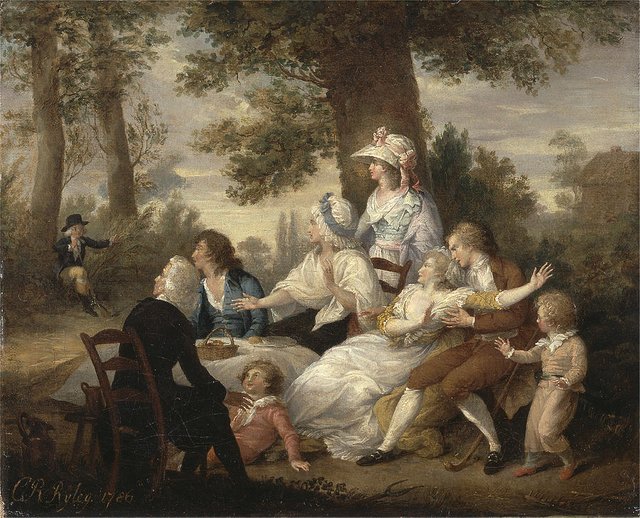The Diary Game 13/09/2021 A Stop Among Classics - Vicar of Wakefield by Oliver Goldsmith

There are times in the life of any traveler in the world of books, when he feels the need for a stop. The adventure in the thickets of postmodern prose, through which the hiker has to make his own path, in search of a meaning can eventually make you tired of one. The always painful encounter with the perverted anti-heroes and alienated from the information society, always devoted to excesses of any kind, leaves you with a bitter taste.
When the form but also the content of the contemporary texts start to seem too oppressive and you kind of soothe your reader's enthusiasm, it is clear that you need a little rest, in the shadow of the great classics. A familiar, well-beaten place, where you can spend a few moments, where you can find literary comfort. A recent choice for such a stop is the recent edition of the novel "The Vicar of Wakefield". It is to be welcomed, first of all, the quality of the translation, taking into account that the novel and implicitly, the English in which it was written, are more than 200 years old, and the archaic character of the language can only increase the difficulties of any translator.
Presented in the form of fictional memoirs, put on paper by an English vicar from the 18th century, the story overflows, at first sight, with naivety and sentimentality. A world is revealed to us in which the patient, honest and principled go through hardships but receive, in the end, the reward for the steadfastness and serenity they have shown. Vicar Primrose and his large family lead a patriarchal life of temperance and humility. But the peace of their home does not last long, for it is touched by the unfortunate event and the amorous whims of an unscrupulous young boyar.
The vicar's family's attempts at fate slowly enter the scene at first, and seem to make up a number of unfortunate coincidences. First the vicar loses his fortune, then one of the daughters is seduced by the nobleman of the land and runs away from home and imprisonment, son's detention, the death of the seduced daughter, the abduction of the second daughter are just some of the endless series of misfortunes that follow.
You could say that Primrose is simply an unparalleled unlucky man, but it is becoming clearer, as catastrophes rush in, that not even the most unlucky character can be subjected to so many consecutive troubles without any particular purpose. And the finality is not difficult to decipher - the vicar's destiny has much in common with Job's biblical destiny. But the story of the vicar does not slip into a theological-philosophical discussion about the role of testing faith or the presence of evil in the world, but ends quickly in an atmosphere detached from stories, with celebrations, feasts and weddings.
Happiness (even on Earth) is for those who know how to wait, forgive and love their fellows. Goldsmith's work can be seen as a literary staging of the Christian maxim, and yet it is not overly moralizing, because it does not take itself seriously enough. The novel's touches are not tragic, but melodramatic, even when the climax of misfortune seems to be reached. And this aspect can be seen in the lucidity and serenity that Primrose seems to keep in the darkest situations.
In terms of action, the Vicar of Wakefield seems to be a historically contextualized fairy tale. And, why not admit, if we have not completely lost the naivety of our childhood, that we like to enjoy, at least in the fictional realm, the victory of good over evil, in the most simplistic way.
The novel is not interesting especially through narration, but rather through construction and language. Although it is presented in the form of a diary written in the first person, the narrative often turns into a religious sermon or even a well-argued micro-essay on the topic of justice, social differences and politics. There are ballads and poems that sometimes make you forget the tragedy of the protagonists.
The way in which Goldsmith shifts his attention to the thread of the action softens the emotional impact that the fate of the Wakefield family has on the reader. Perhaps the most pleasant element that you will enjoy in the literary stop, in the shadow of the novel written by Goldsmith, remains the language. From the first pages you are seduced by the precision and grace of the typical 18th century phrase.
Every word is chosen and weighed carefully, repetitions, banalities are excluded, any dialogue resembles a salon debate, in which rhetorical tricks and stylistic means are thrown into play. And, even if it defies the limits of the probable (it's hard to believe that the people of the country had such a chosen language) Goldsmith's calophilous option gives you the delight caused by the encounter with the well-preserved vestiges of a museum (you will not find such language in the novels of the twentieth century).
If you haven't reached Goldsmith's stop yet, approach with confidence and rest. You will find a ready-made story, with clear and optimistic conclusions, a nice protagonist and phrases, many beautiful phrases.
Image Sources:
The Vicar Of Wakefield, Vol by Litz Collection
YouTube: